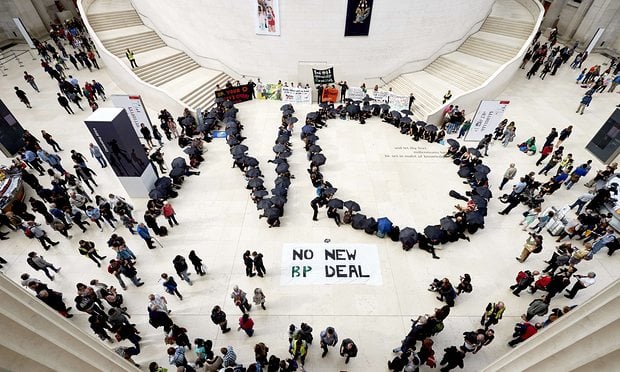
Four major cultural institutions in London, including the British Museum, the National Portrait Gallery, the Royal Opera House and the Royal Shakespeare Company, have committed to signing a new 5-year, £7.5 million ($9.8 million) sponsorship deal with BP, provoking the ire of protesters desperate to transition away from reliance on fossil fuels.
The decision comes just weeks after the Art Not Oil coalition published an extensive damning report on BP’s “corrupting influence” over the institutions it sponsors. The report, which accuses institutions of letting the oil giant interfere with curatorial decisions, is currently being considered in an ongoing ethics investigation by the Museums Association.
Greenpeace activists at the British Museum. Photo courtesy Greenpeace UK.
Not every institution chose to renew the controversial sponsorship, however. In March, Tate finally announced it was severing ties with the company when its current sponsorship deal comes to its close in 2017. This decision might explain why the total amount of money that BP has pledged to cultural sponsoring has decreased from £10 million ($13 million) in the previous deal to £7.5 million ($9.8 million) in this renewal.
Art collective Liberate Tate spent six years in the lead-up to the landmark decision carrying out performance-based interventions to challenge the notorious sponsorship. Yasmin Da Silva, one of the performers with Liberate Tate, has said of the renewed sponsorship agreements in a statement:
“The news that a number of cultural institutions have decided to renew sponsorship with BP comes after 14 consecutive months of record global temperatures. […] By providing BP with a veneer of cultural respectability, institutions like the British Museum and the Royal Opera House are actively aligning themselves with those who seek to trash the climate. They can expect a renewed wave of creative intervention from the many groups who are pushing back against the destructive power and influence that oil companies are exerting in our society.”
Art activist install protest artwork at the British Museum in London. Photo: Kristian Buus, Courtesy BP or not BP?
“This will be a hugely unpopular move and wildly out of touch with the mood across the cultural sector,” Chris Garrard said on a statement on behalf of BP or not BP?, an activist theater troupe that has voiced its determination to overturn the sponsorship agreement. “Just weeks ago, BP’s corrupting influence over these cultural institutions was exposed in a damning report, uncovering the way the company uses sponsorship to keep drilling, spilling and costing up to corrupt regimes.”
“At a time when the world needs to urgently shift away from fossil fuels, the idea that these institutions will still be promoting an oil company into the 2020s is deeply irresponsible. As the devastating effects of climate change become ever more apparent, this decision will look more shortsighted with every passing day,” he added.
Garrard and other members of the Art Not Oil coalition call on the cultural world to “creatively and vocally” condemn BP’s involvement with cultural institutions. In April, a letter signed by almost 100 cultural figures calling on Hartwig Fischer to end BP’s deal with the British Museum was published, and there have been many other high-profile protestations of the partnerships.
“BP is ripping off our cultural institutions—their sponsorship provides less than 0.5 percent of British Museum’s budget. With this pocket change, BP buys legitimacy, access to invaluable advertising space, and masks its role in destroying indigenous lands, arming dictatorships, and wrecking our climate. The museums help BP do that. That’s why art interventions and protests against BP will go on. The new deals will not last five years,” Anna Galkina from Platform, another organization that has campaigned for the sponsorship deals to be dropped and that has forced Tate to disclose historic sponsorship fees and documents in court, warned in a statement.